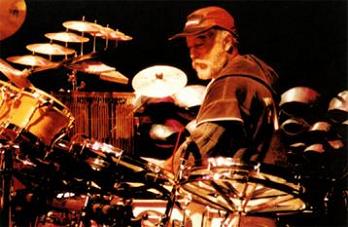
 : : Great drummers
: : Great drummers
- Acuña Alex
- Agostini Dante
- Alexander Tim "Herb"
- Allen Tony
- Ameen Robby
- Appice Carmine
- Aronoff Kenny
- Arpino Thierry
- Barretto Ray
- Belleville Pierre
- Bellson Louie
- Bissonette Gregg
- Blackwell Ed
- Blaine Hal
- Blakey Art
- Bonham John
- Bozzio Terry
- Brown Carlinhos
- Brown Gerry
- Bruford Bill
- Carrington Terri Lyne
- Ceccarelli André
- Cerrone Marc
- Chambers Dennis
- Cinelu Mino
- Clarke Kenny
- Cobham Billy
- Colaiuta Vinnie
- Collins Phil
- Conte Luis
- Copeland Stewart
- Da Fonseca Duduka
- de Grasso Jimmy
- de Johnette Jack
- Diabaté Inza
- Diaz Miguel "Anga"
- Dodds Warren "Baby"
- Donati Virgil
- Dunbar Lowell “Sly”
- Erbetta Marc
- Erskine Peter
- Escovedo Sheila "E"
- Ewandé Louis César
- Fanfant Jean-Philippe
- Foster Al
- Gadd Steve
- Garibaldi David
- Gastaldin Claude
- Gonzalez Jerry
- Gozzo Alain
- Greer Sonny
- Grohl Dave
- Guem
- Gurtu Trilok
- Gustke Ralf
- Hakim Omar
- Haynes Roy
- Hernandez “El Negro” Horacio
- Hidalgo Giovanni
- Higgins Billy
- Hoglan Gene
- Humair Daniel
- Hussain Zakir
- Jacquin Jean-Christophe
- Jimbo Akira
- Jones Elvin
- Jones "Philly" Joe
- Jones « Papa » Jo
- Jordison Joey
- Katché Manu
- Keita Mamady
- Kolinka Richard
- Krupa Gene
- Lake JR Oliver Gene
- Lang Thomas
- Latham Rick
- Mac Brain Nicko
- Mason Harvey
- Mattalia Alessia
- Mayer Jojo
- Michelino Silvano
- Minnemann Marco
- Mitchell John "Mitch"
- Mocidade Independente de Padre Miguel
- Moeller Sanford
- Moreira Airto
- Morello Joe
- N'Diaye Rose Doudou
- Oxley Tony
- Paice Ian
- Paolini Jean-Claude
- Parker Leon
- Peart Neil
- Phillips Simon
- Poleo Orlando
- Porcaro Jeff
- Portnoy Mike
- Pozo Chano
- Priester Aquiles
- Puente Ernesto « Tito »
- Purdie Bernard "Pretty"
- Quintana Jose Luis "Changuito"
- Rekow Raul
- Renaudin Bertrand
- Rich Buddy
- Roach Max
- Roddy Derek
- Samba Mokhtar
- Sanchez Poncho
- Santamaria Mongo
- Séry Paco
- Smith Chad
- Smith Marvin “Smitty”
- Smith Steve
- Sorum Matt
- Starr Ringo
- Stewart Bill
- Stubblefield Clyde
- Temiz Okay
- Terrana Mike
- Top Secret Drum Corps Basel Suisse
- Ulrich Lars
- Vander Christian
- Wassy Brice
- Watts Charlie
- Watts Jeff
- Webb Chick
- Weckl Dave
- White Lenny
- Wilk Brad
- Williams Tony
- Ziad Karim
Temiz Okay
Musicians or bands:
Ulvi Temel, Maffy Falay, Don Cherry, Johnny Dyani, Dexter Gordon, George Russel, Clark Terry, Bobo Stensson, Pale Danielson
Biography and commentary:

Okay Temiz is a Turkish percussionist and drummer (born in 1939 in Istanbul), probably the first to mix jazz (modern drumset) and traditional Turkish music in the 1970s (if we exclude the attempts of Joe Morello with Dave Brubeck : example: "Blue Rondo à la Turk", album "Time Out", 1959). He has traveled and worked with many jazz musicians around the world (Sweden, USA, South Africa, etc.). Turkish music is marked a lot by the complex rhythms with asymmetrical measures (as in Persia or India, or in South Asia, where the Turkish people "passed" and settled throughout the centuries). These rhythms, often break down into simpler measures (2/4 or 3/4), make well this musical culture, the most sophisticated rhythmically in the world, contrary to stereotypes that associate this sophistication to the music of Black Africa. In fact, these complex rhythms (measures in prime numbers of beats, notably: 5, 7, 11, etc., very difficult to "think" and play), to be made more accessible to the public, are often played in unison by all instruments in the Turkish tradition, unlike the African percussive music, where it is the polyrhythm which is complex and predominant (superposition of different measures), but in general with basic measures almost always simple (binary: 4/4 ) sometimes with a subdivision of each beat in 3 (triplets or even swing), and rhythms in 3 over 4, 6 over 4, more rarely 5 over 4, in choruses (concepts taken over in the American jazz and rock). In other words, if the Mandingo (with perhaps the Voduns and most recently Cuban and Brazilian people, which are also partly descended from these African people), are for me the greatest savants of polyrhythm, Turkish and Persians, are those of rhythm. Each culture has its musical preferences in fact, historically, sometimes dictated by religious prohibitions originally to distance itself from the others: arrhythmic polyphony in Christian Europe, melody in middle east and far east or with the Celts ("arabesque" , arpeggios and ornamentation). The Turks also influenced the Near East and even Maghreb (listen to the Franco-Algerian drummer Karim Ziad), where they settled before and during the Crusades (Seljuk Turks and Mamluks). I also remind that the most common drumset cymbals (crash and rides) and the snare and bass drums are Turkish inventions brought into France under Louis XIV, at the time allied with the Ottoman Empire (listen to the "marche pour la cérémonie des turcs", from Jean-Baptiste Lully composed for the comedy-ballet "Le Bourgeois Gentilhomme" (1670) by Molière in the court of the "Sun King", with no cymbal but with drum, although representing a beginning of "Turkish fashion" ("Turquerie"), even if slightly mocking). They had a martial and ceremonial use by the Turks, often riding (Janissaries), complementing trumpets and timpani, hence the pair, one on each flank of dromedary, for balance (timpani are themselves probably of Mongolian origin (called "naccaras"), they were used to give the signal for ambushes during the conquests of Genghis Kahn, which also included Turkish regiments, and traditional bamboo mallets with felt are an indicator of this cultural origin). Adopted with difficulty in Europe (long considered as "noise" by the aristocracy, because of their uncontrollable and indeterminate tone but also certainly for religious reasons), timpani are still used for parades of the Republican Guard on horseback, in France, since Napoleon Bonaparte. The French word "tambour" (“drum”) itself comes from the Persian "Tabir". Okay, has built himself a whole drum set with Turkish darbukas (goblet hammered bronze drums, usually played with fingers, modern battery being finally essentially composed of Turkish instruments originally, if we exclude pedals and stands, and taken over as they are in European armies) instead of the toms, and he is also a "polypercussionniste" who plays all the percussion instruments of the world with a Turkish "touch" but also African, Brazilian, jazz or very "fusion" rock. A drummer to discover that opens vast horizons to creative drummers (Terry Bozzio has notably composed a solo based on Turkish music, imitating a darbuka (Turkish or Arabic) with the feet independently with the playing of the hands on the toms and cymbals: "Cairo").
Marc De Douvan, publication in French: November 22, 2006 (for the translation in English: July 12, 2015)
Official website
See© 2005 Marc de Douvan Crédits Mentions légales
